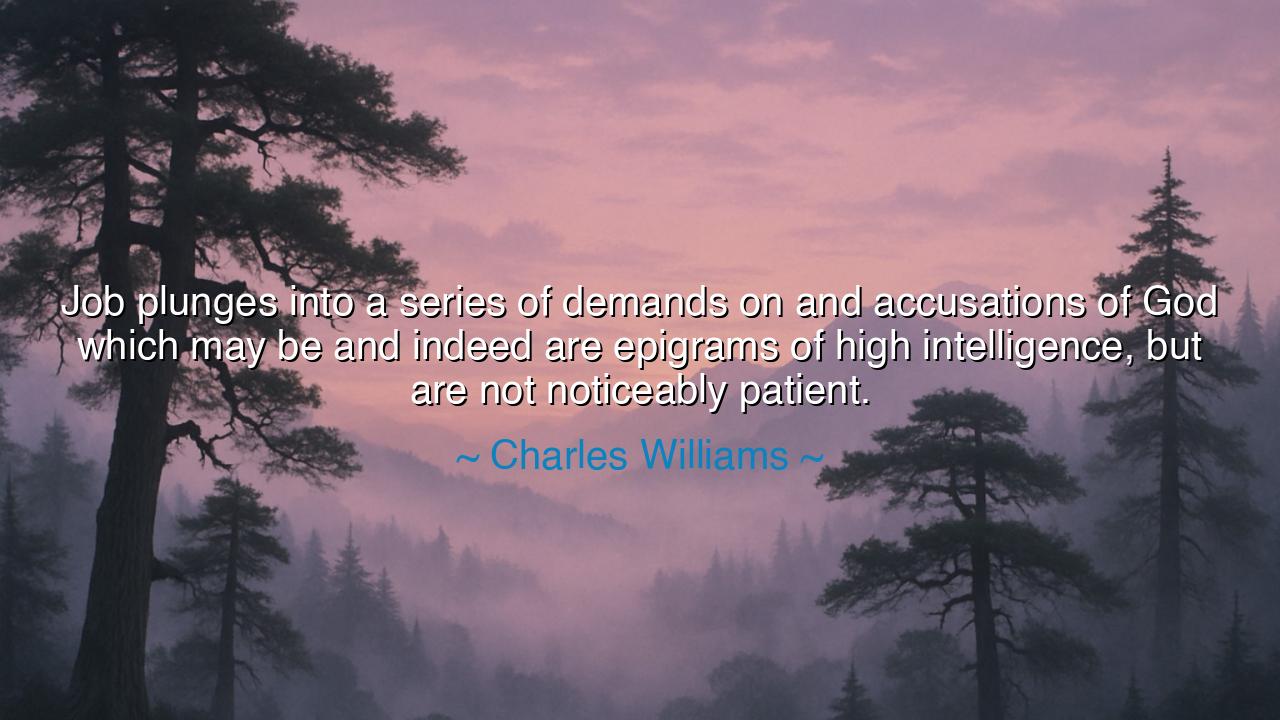
Job plunges into a series of demands on and accusations of God
Job plunges into a series of demands on and accusations of God which may be and indeed are epigrams of high intelligence, but are not noticeably patient.






In the grand saga of human suffering and the search for meaning, few stories resonate as deeply as that of Job, the biblical figure who endured unimaginable trials and wrestled with his own existence. Charles Williams’ words, “Job plunges into a series of demands on and accusations of God which may be and indeed are epigrams of high intelligence, but are not noticeably patient,” speak to the profound complexity of Job’s character and his struggle with the divine. Job's story, though a tale of great suffering, is also one of intellectual confrontation—a man of great wisdom, questioning his faith and reason in the face of suffering. Williams acknowledges the intelligence in Job’s accusations, yet he highlights the absence of patience, which is often the first virtue we must cultivate in times of hardship.
In the ancient world, patience was a prized quality, often revered as the foundation of both wisdom and moral strength. Socrates, the great Greek philosopher, spoke of the virtue of patience in the face of adversity, arguing that true wisdom arises not from the rushing of decisions, but from the careful contemplation of them. In this light, Job’s outbursts, his demands and accusations, seem at odds with the ancient view of patience as a guiding force in moments of trial. Socrates himself was condemned to death, not in silence, but with a measured, patient defiance. He faced the ultimate punishment with a calm acceptance, understanding that wisdom requires both reflection and restraint. In contrast, Job’s cry to God is one of impatience, driven by the depth of his suffering and the desperation to understand the reason behind it.
Job’s demand for answers can be seen as a reflection of human intelligence at its peak—keen, questioning, and unwilling to accept suffering without understanding. His wisdom in seeking a rational explanation for his pain echoes the philosophical questions that have plagued humankind for millennia: Why do the innocent suffer? Why do we endure the unexplainable? In this sense, Job's intelligence shines as a beacon, a testament to the human drive for understanding. However, as Williams points out, while Job’s words may be epigrams of high intelligence, they are also void of the patience required to face the mysteries of life with humility. Patience, it seems, is not merely the ability to wait, but the ability to accept the unknown without demanding immediate answers.
Consider the story of the Buddha, who, after years of intense spiritual seeking and self-denial, reached enlightenment not through intellectual inquiry alone, but through profound patience and acceptance of suffering. The Buddha did not demand answers from the universe, nor did he lash out in anger. Instead, he sat, in deep meditation, patiently observing the nature of his own mind and the suffering of all beings. Through this, he arrived at the understanding that suffering is an inherent part of existence and that true wisdom comes not from fighting it, but from embracing it. In contrast to Job’s intellectual demands, the Buddha’s path of patience led him to a profound peace, teaching us that wisdom does not always lie in seeking answers but in accepting the questions with an open heart.
Yet, there is a powerful lesson in Job’s impatience as well. His raw, unfiltered questioning of God challenges us to confront the reality of suffering in its most direct form. In his cry, Job exposes the human need to understand, to make sense of the chaos that often seems to define our lives. His story teaches us that intellect and faith can coexist in tension, and that it is not the absence of questions that marks wisdom, but the willingness to ask them—even when the answers may never come. Job’s journey through suffering, though marked by impatience, is ultimately one of growth, as he learns that not all answers are to be understood through intellect alone. Some truths, he discovers, must be accepted through the quiet spaces between the questions.
In our own lives, we often find ourselves in situations where we too are impatient for answers. Whether faced with personal loss, failure, or uncertainty, we can be driven by the need to know why things happen the way they do. But, like Job, we must remember that intellectual questioning can sometimes obscure the deeper wisdom that lies in patience. Patience does not mean inaction or blind acceptance, but a trust that there are answers beyond the grasp of immediate understanding—answers that are found not in defiance, but in acceptance of the mystery.
Therefore, let us learn from Job’s example and from the ancient wisdom of those who sought truth not through blind acceptance, but through deliberate questioning and refinement. In moments of suffering, we are reminded that patience is not a passive act, but a profound strength that allows us to endure. Let us ask our questions, but let us also hold space for the mysteries that may never be answered. Through this, we will find a deeper, more enduring wisdom, and we will learn that patience, not inaction, is often the greatest response to the trials of life.






AAdministratorAdministrator
Welcome, honored guests. Please leave a comment, we will respond soon